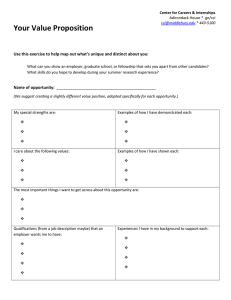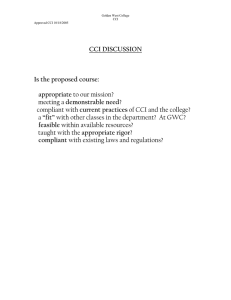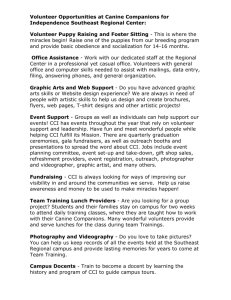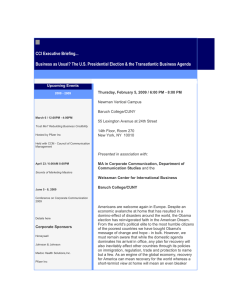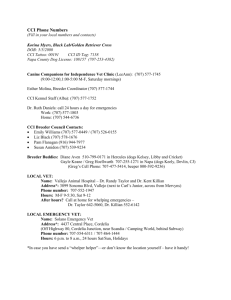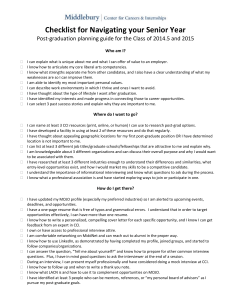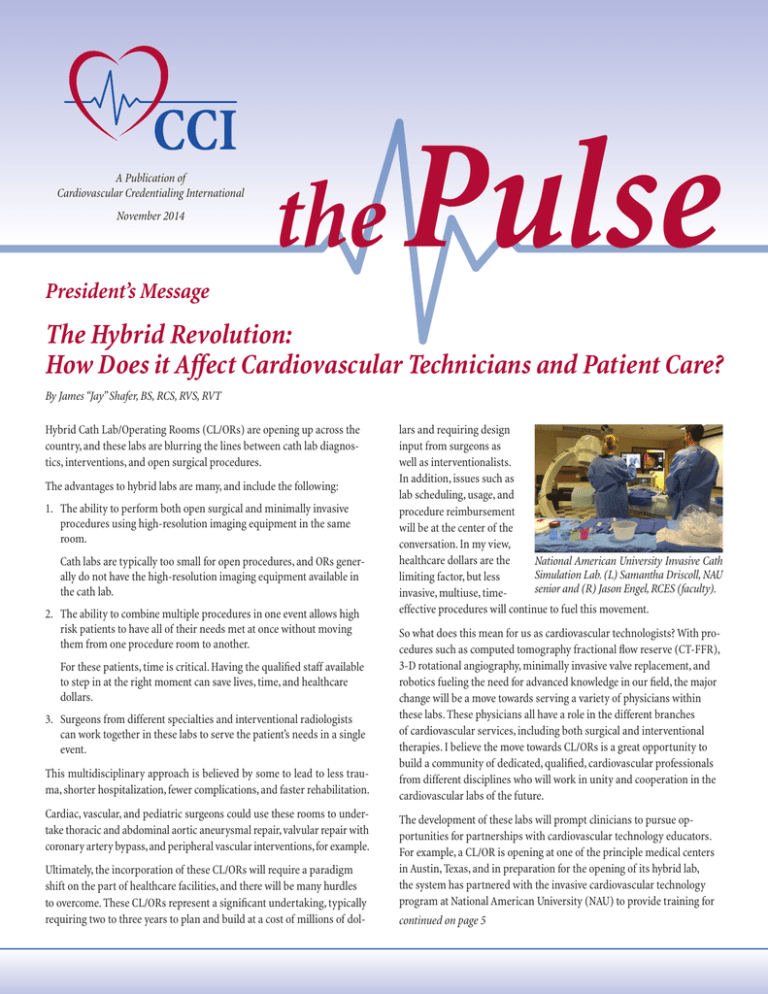
A Publication of
Cardiovascular Credentialing International
November 2014
the
President’s Message
Pulse
The Hybrid Revolution:
How Does it Affect Cardiovascular Technicians and Patient Care?
By James “Jay” Shafer, BS, RCS, RVS, RVT
Hybrid Cath Lab/Operating Rooms (CL/ORs) are opening up across the
country, and these labs are blurring the lines between cath lab diagnostics, interventions, and open surgical procedures.
lars and requiring design
input from surgeons as
well as interventionalists.
In addition, issues such as
lab scheduling, usage, and
procedure reimbursement
will be at the center of the
conversation. In my view,
healthcare dollars are the
National American University Invasive Cath
Simulation Lab. (L) Samantha Driscoll, NAU
limiting factor, but less
senior and (R) Jason Engel, RCES (faculty).
invasive, multiuse, timeeffective procedures will continue to fuel this movement.
The advantages to hybrid labs are many, and include the following:
1. The ability to perform both open surgical and minimally invasive
procedures using high-resolution imaging equipment in the same
room.
Cath labs are typically too small for open procedures, and ORs generally do not have the high-resolution imaging equipment available in
the cath lab.
2. The ability to combine multiple procedures in one event allows high
risk patients to have all of their needs met at once without moving
them from one procedure room to another.
So what does this mean for us as cardiovascular technologists? With procedures such as computed tomography fractional flow reserve (CT-FFR),
3-D rotational angiography, minimally invasive valve replacement, and
robotics fueling the need for advanced knowledge in our field, the major
change will be a move towards serving a variety of physicians within
these labs. These physicians all have a role in the different branches
of cardiovascular services, including both surgical and interventional
therapies. I believe the move towards CL/ORs is a great opportunity to
build a community of dedicated, qualified, cardiovascular professionals
from different disciplines who will work in unity and cooperation in the
cardiovascular labs of the future.
For these patients, time is critical. Having the qualified staff available
to step in at the right moment can save lives, time, and healthcare
dollars.
3. Surgeons from different specialties and interventional radiologists
can work together in these labs to serve the patient’s needs in a single
event.
This multidisciplinary approach is believed by some to lead to less trauma, shorter hospitalization, fewer complications, and faster rehabilitation.
Cardiac, vascular, and pediatric surgeons could use these rooms to undertake thoracic and abdominal aortic aneurysmal repair, valvular repair with
coronary artery bypass, and peripheral vascular interventions, for example.
The development of these labs will prompt clinicians to pursue opportunities for partnerships with cardiovascular technology educators.
For example, a CL/OR is opening at one of the principle medical centers
in Austin, Texas, and in preparation for the opening of its hybrid lab,
the system has partnered with the invasive cardiovascular technology
program at National American University (NAU) to provide training for
continued on page 5
Ultimately, the incorporation of these CL/ORs will require a paradigm
shift on the part of healthcare facilities, and there will be many hurdles
to overcome. These CL/ORs represent a significant undertaking, typically
requiring two to three years to plan and build at a cost of millions of dol1
CCI Board of Trustees & Senior Staff
BOARD OF TRUSTEES
President
James J. Shafer, BS, RCS, RVS, RVT
President Elect / Executive Exam Committee Chair
Ken Horton, RCIS, RCS, RDCS, FASE
Treasurer
Marsha Roberts, RCS, RDCS, FASE
Secretary
Gail Size, BS, RPhS, RVS, RVT, FSVU
Immediate Past President
Douglas L. Passey, RCES, RCIS, FSICP
Non-Invasive Echo Exam Committee Chair
Brad Roberts, RCS, RDCS, FASE
Invasive Exam Committee Chair
Erik W. Hushelpeck, RCES, RCIS, FSICP
Electrophysiology Exam Committee Chair
Douglas L. Passey, RCES, RCIS, FSICP
Vascular Exam Committee Chair
Lisa Cannon, RVS, RVT
Phlebology Exam Committee Chair
Jeannie White Melendez, RPhS, RVT, FSVU
Cardiac Congenital Exam Committee Chair
Elaine A Shea, RCCS, RCIS, RCS, FASE
Certificate Level Exams Committee Chair
Thomas O’Brien, AS, CST, CCT, CRAT
Public Member
Rick Hoffman, CPA/ABV
BOARD OF ADVISORS
The following organizations nominate a representative of their
cardiovascular specialty field to sit on the CCI Board of Advisors.
American College of Cardiology (ACC)
Joseph Messer, MD, MACC
American College of Phlebology (ACP)
Nick Morrison, MD, FACS, FACPh, RPhS
Joe Zygmunt, RPhS, RVT
American Society of Echocardiography (ASE)
Allan L. Klein, MD, FRCP(c), FACC, FAHA, FASE
Richie Palma, RCS, RDCS, FASE
Heart Rhythm Society (HRS)
Shoei K. Stephen Huang, MD, FACC, FAHA, FHRS, CCDS
Barbara Thomas, RN, FHRS
Society for Cardiovascular Angiography and Interventions (SCAI)
Joseph Babb, MD, FCCC, FACC, FSCAI
Farewell
After over eleven years of service as Executive Director of Cardiovascular Credentialing International,
I announced at the beginning of October that I have tendered my resignation effective October 31,
2014. Although I am not a healthcare professional, I have a passion for the cardiovascular technology
field of practice, and I am proud of the accomplishments that I have helped CCI as an organization
attain. However, after over a decade of reaching a number of milestones including assisting in the
finalization of the conversion to a computer-based testing format, the development of four new
credentialing programs, and the attainment of ANSI/ISO 17024 accreditation of all eight of CCI’s
credentialing programs, I am ready for new challenges in my professional career.
I have been blessed to be surrounded by outstanding volunteer leaders throughout my time with
CCI. These volunteer leaders, including members of CCI’s Board of Trustees, Board of Advisors,
Examination Committees, and standing committee from all sub-specialty fields of cardiovascular
technology have given me support and guidance in so many ways. The same can be said for the staff
and volunteer leaders of all the organizations I have had a chance to work with over the years. Representatives of organizations such as professional societies, laboratory and educational accreditation
bodies, and even my peers at related credentialing bodies have been friends and colleagues of mine
for many years, and I am pleased to have been a small part of the success we have achieved together.
I have also been honored to work with a team of dedicated staff. This team has grown in my eleven
years with CCI and will continue to grow and thrive as the organization expands to meet the demands for credentialing qualified cardiovascular professionals worldwide.
Last but certainly not least, I want to say thank you to CCI’s Registrants. I have had an opportunity
to meet many of you over the years at professional society conferences or through emails and phone
calls. CCI has some of the best credential holders in the world, and I am proud to know that you all
strive to improve patient care in your profession.
As I move on to other challenges, I hope that all of you whom I have had the pleasure of meeting will
know that you have made a positive impact in my life, and you have shown me that doing what you
love can mean so much in one’s life.
Sincerely,
Aaron S. White
Executive Director, 2003-2014
Society for Vascular Ultrasound (SVU)
Anne Jones, RN, BSN, RVT, RDMS, FSVU
Society of Diagnostic Medical Sonography (SDMS)
David Adams, RCS, RDCS, FASE
Society of Invasive Cardiovascular Professionals (SICP)
Tracy Simpson, ARNP, RCIS, FSICP
Honorary Board Member - Historian
Dennis K. Carney, RCIS, RCS, FASE
CCI is on Facebook!
Like us at www.facebook.com/ccionline.org
SENIOR STAFF
Executive Director
Aaron S. White
Associate Executive Director and Examination Coordinator
Jerel Noel
Director of Communications and Editor of The Pulse
Christine Johnson
Director of Finance
Ellen Gioelli
The Pulse and CCI are trade names of CCI. The Pulse is copyrighted by CCI and authorization to photocopy items for
internal or personal use is granted by CCI. Opinions expressed in The Pulse are not necessarily those of the
CCI Board of Trustees, its agents, editors, advertisers or anyone connected with the publication. CCI assumes
no liability or responsibility for any claims, actions or damages resulting from publication of any article.
CCI does not endorse nor recommend any review course or review material.
Director of Operations
Stephanie Brown
Cardiovascular Credentialing International
1500 Sunday Drive, Suite 102, Raleigh, NC 27607
phone: 800-326-0268; fax: (919) 787-4916
www.cci-online.org
Assistant Director of Operations
Katesha Phillips
Executive Assistant
Valerie Hunter
©2013. Cardiovascular Credentialing International. All rights reserved.
2
Registrant Spotlight
This section spotlights a CCI registrant for his or her accomplishments and dedication to the cardiovascular profession. Submissions may be sent to Christine
Johnson via email to cjohnson@cci-online.org.
Mike Foster, BA, RCCS,
RCS, RDCS (AE, PE), FASE
gists, and nurses; and teaching cardiac anatomy, physiology, and how to
record these with ultrasound. As a result of Mike’s work in Kenya, CCI
gained its first RCS-credentialed technologist in Kenya.
Mike Foster grew up in Arkansas and began his
career in healthcare working as a pharmacy tech
while earning a BA in Human Resources from
Harding University. He continued as a pharmacy
tech while playing music and “goofing off ” in Memphis, Tennessee.
Mike says, “I’m a big believer in obtaining a credential, should your field
offer one. It shows that you have demonstrated a competent level of understanding in your field that can benefit a doctor’s practice to help patients.
Since I’m a cardiovascular technologist in echocardiography, the CCI
credentials are very appropriate to demonstrate that I’m a professional.”
After moving to Spokane, Washington, he completed the Non-invasive
Cardiovascular Technology program at Spokane Community College, earning his Associate in Applied Science. As an avid runner, Mike
thought studying the heart would be interesting, and he became a
student of Dennis Carney and Darren Powell. Dennis gave him an opportunity to finish his last clinical rotation at Duke University Health
System in Durham, NC. There he trained with CCI Past President John
Toptine and CCI Board of Advisors member David Adams. He was also
mentored by Dr. Joseph Kisslo (in phased array technology, the first digital PACS system for echocardiography, and 3D ultrasound) and Dr. Tom
Ryan (who trained under Dr. Feigenbaum and is the current co-author of
Feigenbaum’s Echocardiography).
Mike continues, “Not everyone comes from countries with schools,
credentialing bodies, and/or professional societies in cardiovascular
medicine. It may be difficult for these people to obtain the knowledge
and training to pass a registry-level exam. However, a mechanism to
demonstrate that the individual is making efforts to learn echocardiography, like a certificate, can mean more money and credibility for that
employee at his or her institution. That’s why I’m very excited to see CCI
develop the “Basic Echocardiography Exam” for these people with fewer
resources. It is a productive and affordable step towards registry-level
credentials for their careers.” ♥
CCI Credential Renewal –
December 31 – Now Due
In 1999, Mike began his echo career as a junior technologist in the
Cardiac Diagnostic Unit (adult echo) and still works there today. He truly
enjoys the teaching and learning environment.
Mike credits his mentors with impressing upon him the importance
of being active in the cardiovascular field at either the local or national
level. Mike joined the American Society of Echocardiography (ASE) as
a student and has been a member ever since. He has spoken at the ASE
Annual Scientific Sessions, served on the ASE Committees, and recently
was a member of the ASE International Sonographer Training Task Force.
Mike has also been awarded the designation of a Fellow of the ASE.
The expiration date for CCI credentials by December 31, 2014 is
now due!
New Registrants credentialed between January 1 and March 31,
2014 are not required to submit CEUs. Submit only a signed copy
of CCI’s Code of Ethics with payment of renewal fees.
Submitting CEUs from an approved site does not mean that they
are automatically accepted. Registrants who hold Registry credentials need to submit 36 CEUs, 30 of which must be cardiovascular
related CEUs to complete the renewal process. Certificate level
registrants are required to submit 16 CEUs. Please refer to our
website www.cci-online.org and click on Links and Resources,
CEU Providers.
In addition to volunteering with the ASE, Mike is a member on the Board
of Directors for the North Carolina Ultrasound Society (NCUS). Mike
has contributed his time and expertise to CCI as a subject matter expert
writing items and Task Analysis for the Registered Cardiac Sonographer
(RCS) examination, representing CCI at bi-annual NCUS meetings, and
writing an article about CCI for the NCUS newsletter. He also provided
valuable guidance to CCI with the development of the new Basic Echocardiography examination, which is designed for individuals outside of
North America.
Registrants may retake the Registry exam at any time during their
triennial, with no penalty at a reduced cost, to satisfy their CEU
requirement. Exam must be completed and passed before end of
triennial cycle.
Over the past four years, Mike has had the opportunity to work in Kenya
as a part of a teaching grant awarded to Duke through a Center of Excellence Grant from the NIH. Along with providing philanthropic funding,
Duke has also teamed up with AMPATH and Moi Teaching and Referral
Hospital to develop a Cardiology Clinical Research fellowship and build
a Cardiac Care Unit. Mike has made numerous trips to Kenya and given
much of his time lecturing; working one-on-one with doctors, technolo-
Renew online today! You can now sign your Code of Ethics online
and pay your renewal fees online by logging into your CCI account.
All of your required CEUs must be submitted before payment will
be processed. ♥
3
What’s In An Interview? What’s To Be Considered?
By Joe Giron RN, RT, RCIS, RCES, CEPS, SpringBoard, Inc. , 866.465.6286
We have all been there, some of you may be feeling it right now, however
there are those whom have found great success with it. The ‘interview
process’. The thought of an interview, along with crafting all of the elements needed prior to the interview, can be a nail biting experience to
which we can all relate. That being said, you can really do more than just
take the edge off, and gain a lot of personal confidence in the process, by
creating a plan. Depending on the type of job you are looking for there
are many different considerations: industry, location, position, opportunity for advancement. However, creating and adhering to a plan will set
you up for success. Here are few tips to think about depending on your
job classification.
References are extremely important
for a couple of reasons. First, the cardiology field can be
a small one and chances are somebody may know a colleague where you
are coming from or looking to go to. Despite what conventional HR pros
will tell you about what you should and should not say, hiring managers
will discreetly leverage anyone they can to get an accurate evaluation. In
the field of cardiovascular services, a list containing a physician, direct
supervisor, sales/clinical rep and co-worker is a good working mix. When
composing your reference list, it is a great idea to keep it current as you
go, and contact your references frequently to keep them informed and
prepared for future contact from potential employers for a few reasons.
First, it is good form for your references to know they may be getting a
HR call. Secondly, your reference may have a better lead and/or influence to your job prospecting, especially if you have a diverse reference
list. Truth be told, good sales/clinical reps also make great references, as
they are trained to sell and often cover many accounts were they may
have great relationships. When a resume gets a bit long, a great idea is to
state ‘references upon request’. This ensures they will call you back right
away if interested and keep that first impression of a resume as clean and
confined to 1–2 pages.
First things first, update your resume. Understand that there are many
different elements that contribute to a great resume – content, length,
style, format, design – however most important is strategy. Know your
audience, understanding that your resume will be filtered through HR
administrative staff and eventually to the hiring manager. For HR, format
your work history in reverse chronological order for easy reading. For
both HR and your hiring manager, list your credentials along with your
name as to easily highlight your qualifications and advancements. For
your hiring manager, open up your resume with an objective or summary statement, citing your experience along with your career intentions
in a few sentences. Once you have amassed a wide body of experience,
it may be a challenge to condense the content of your experience. Don’t
overstate your clinical experience; in fact condense it if you must, consider bullet points. Consider a “clinical skills” section at the top of your
experience that highlights all of your skills and competencies. Then you
can condense the timeline to facility, location and years worked. When
your resume is formatted, keep it clean and 1-2 pages max.
In addition, leaving on good terms is always a good idea so giving two
weeks’ notice, or more, is the most professional way to go. If you are
working contracts (travel or per diem) be sure you are successfully
completing those assignments. Contracts or per diem blocks that are cut
short require an explanation. Be prepared to answer those questions.
Social media has become a great portal for job hunting, networking and
the like. The debate rages on regarding the ethics of a potential employer
being able to consider non work related activity through social media
with respects to your job candidacy. Nonetheless, make it easier on yourself and close and/or modify such social portals as Facebook to be clean
and/or closed to the public. On the flip side of the coin, use social media
to your advantage leverage job-friendly social portals like LinkedIn.
Make a LinkedIn profile and put the public LinkedIn address on your
resume; join a few clinical LinkedIn groups and reach out to other members of the group for tips; lastly, post some articles related to your field to
show active involvement. As an example, if you are working in electrophysiology and working towards your RCES or CEPS credentials, put that
on your resume. If your job classification is in high demand, understand
the potential advancement credentials available, list the credentials
you’ve already obtained research the other credentials that interest you.
After an interview (in which you only were able to describe yourself in a
1-2 page resume), the LinkedIn profile allows you to more fully describe
yourself without a page limit. It’s the perfect portal to expand on your
background, experience, publications, posts, community service, skills
and endorsements.
Now let’s talk about interviewing. If you get a call for a position you have
applied for, be sure you know exactly the job you applied for. If you aren’t
100% sure, politely ask to set a time to call them back. Presumably, you
can do your research and learn everything you can about the position
and your potential employer. If you are doing a phone interview land
lines are best. Mobile phones are great; however land lines are still the
most reliable, with the greatest clarity. Have a few open-ended questions ready regarding the position or employer. This shows you have
taken some time to prepare. Why is the position open? Tell me about the
culture in your department? How long have you been there and what’s
your background? In person interviews also require similar preparation,
in fact even more so. That first personal interview is the ultimate in first
impressions. Be on time, with a neat, clean appearance - and not bad
mouthing your current employer are absolute musts. Follow up is also
important; even if it’s a travel position a short email thanking them for
their time will set you apart.
Failing to plan is planning to fail. With a bit of planning (and executing that plan), you can empower yourself to attack the job hunt with
confidence, and ultimately position yourself to have the best chance of
success. ♥
4
CCI Credential Renewal –
September 30 – Past Due
Order CCI Wall Certificate
for Framing
The expiration date for CCI credentials by September 30, 2014 is
past due!
As an active CCI credential
holder, you can print a copy of
your certificate at any time by
logging into the CCI website
with your User ID and password. You may also order a professional parchment paper certificate (at left)
suitable for hanging for $25.00 plus
$4.95 shipping and handling from CCI
headquarters. Log into the CCI website
to obtain the order form.
If you have not completed your renewal requirements, you have a grace
period until December 31, 2014 to submit CEUs, signed Code of Ethics
and renewal payment. A copy of the CCI Code of Ethics was included with
your renewal invoice or can be downloaded from our website by clicking
on Registrants, Code of Ethics. The 90-day grace period is extended time
to submit renewal paperwork. A late fee of $50.00 will be assessed to all
registrants who submit their renewals during the grace period.
Please be aware that CEUs must have been earned during the triennial cycle. CEUs earned during the grace period will not be accepted
but will be credited towards your next triennial cycle.
New Registrants credentialed between October 1 and December 31, 2013
are not required to submit CEUs. Submit only a signed copy of CCI’s Code
of Ethics with payment of renewal fees.
President’s Message continued from page 1
its surgical technologists. I have the honor of being the program manager
for NAU’s cardiovascular technology program and have seen first-hand
the benefits of the CL/OR partnership. I have seen how important it is
that technologists receive hands-on training in peripheral diagnostic
and interventional procedures before they are performed in this new
lab. NAU has integrated a Mentice Vist cardiovascular simulator into the
curriculum, and it has provided the opportunity for both cardiovascular
technology students and lab personnel from the surrounding community
to gain experience in these procedures prior to entering the lab. This type
of education and training is key to successful, efficient outcomes for both
patients and their healthcare providers.
If renewal requirements are not completed by December 31, 2014, registrants’ status will become inactive.
Submitting CEUs from an approved site does not mean that they are
automatically accepted. Registrants who hold Registry credentials need
to submit 36 CEUs, 30 of which must be cardiovascular related CEUs to
complete the renewal process. Certificate level registrants are required to
submit 16 CEUs. Please refer to our website www.cci-online.org and click
on Links and Resources, CEU Providers.
Registrants may retake the registry exam at any time during their triennial, with no penalty at a reduced cost, to satisfy their CEU requirement.
Exam must be completed and passed before end of triennial cycle.
The cardiovascular profession should also be aware of the risks these
ventures may present. Questions will be asked such as:
We urge our registrants who have not submitted the required CEUs,
signed Code of Ethics Form, and renewal payment to do so prior to
December 31, 2014 to avoid penalty fees or retesting. Renew online
today! You can now sign your Code of Ethics online and pay your
renewal fees online by logging into your CCI account. All of your required CEUs must be submitted before payment will be processed. ♥
1. Are there quality-of-care risks?
2. Are there facilities risks?
3. Will the hybrid CL/ORs displace specific-use facilities and end up
limiting performance?
4. Will there be laboratory accreditation standards specific to these facilities and more specialized than Joint Commission on Accreditation
of Healthcare Organizations (JCAHO) standards to ensure adherence
to proper practices?
Save the Date!
2015 CCI
Cardiovascular
Educators’ Forum
When these questions have been addressed, credentialed professionals
with specific expertise should be eager to support initiatives such as CL/
ORs that provide better and more cost-effective care, while insisting that
clinicians’ and associate professionals’ education, training, and experience be the cornerstone of effective risk management for the patient
and the facility. Likewise, credentialing organizations should embrace
quality-of-care advancements and seek to apply their experience by
developing standards that will ensure those successful outcomes. ♥
April 17-18, 2015
Westin Las Vegas
Details to come soon
on the CCI website.
5
Oregon Tech Allows Certification Credit
Applied Toward Online Ultrasound Degrees
tional (CCI). *84 college credits granted.
• Vascular Technology - You must be a Registered Vascular Technologist
(RVT) through the American Registry for Diagnostic Medical Sonography (ARDMS) or a Registered Vascular Specialist (RVS) through Cardiovascular Credentialing International (CCI). *90 college credits granted.
• You must be employed in or have access to a full-service, properly
equipped echocardiography laboratory to complete the clinical didactic courses and be eligible for clinical externship credit.
• You must meet the Oregon Tech admissions criteria. Special admissions arrangements are also available.
To provide the foundation for individuals pursuing career advancement or
graduate study programs, Oregon Tech awards college credit toward online
Bachelor of Science Degrees in Echocardiography or Vascular Technology
to eligible individuals. These online degree completion programs enable
registered professionals to earn a bachelor’s degree in their current field
if they currently hold certifications as a Registered Vascular Technologist (RVT), Registered Vascular Specialist (RVS), Registered Diagnostic
Cardiac Sonographer (RDCS), or a Registered Cardiac Sonographer (RCS).
Oregon Tech’s foundation for degree completion is built upon credit
granted for professional registries, allowing students to complete online
degrees at affordable rates and expanding career opportunities. Students
have access to dedicated, personal academic advising and assistance
throughout the program, along with ability to take a single class, or a full
load from their own study environment.
Oregon Tech is one of the few universities in the country, and the only
school in the Pacific Northwest, offering web-based Bachelor of Science
degree completion programs in the high-demand health technologies.
After evaluating individual credits and credentials, Oregon Tech Online
works with students to develop an individualized plan to complete the
program requirements. The programs integrate basic medical science
with specialized professional courses and a general education core.
Who is Eligible?
• Echocardiography - You must be a Registered Diagnostic Cardiac
Sonographer (RDCS) in Adult Echo through the American Registry
for Diagnostic Medical Sonography (ARDMS) or a Registered Cardiac
Sonographer (RCS) through Cardiovascular Credentialing Interna-
For more information, please visit www.oit.edu/online/ultrasound. ♥
*Credits as of Fall 2014
In Memoriam of Ted King, MD, FAAFP, FACPh
A member of the Registered Phlebology Sonographer (RPhS) Examination Committee, Dr. Ted King, died at home on October 15, 2014. He was
59 years old and was a resident of Oak Brook, Illinois.
Ted was a gifted physician who spent many hours
passing on his knowledge to others. He participated
in several clinical trials, was in great demand as
a speaker, and gave lectures in countries around
the world. He was a member of many professional
organizations, including the American College of Phlebology, the American
Academy of Family Physicians, the European Society for Vascular Surgery,
and the Christian Medical and Dental Society.
Ted was born July 26, 1955 in Logansport, Indiana, to Rev. Jack T. and Doris King. He grew up in north-central Indiana and graduated from high
school in Anderson, Indiana. He went on to graduate from Asbury College with high honors, received his MD from Indiana University Medical
School, and did his Family Practice residency at West Suburban Hospital
in Oak Park. Dr. King practiced family medicine in Oak Park for over 15
years before becoming the National Medical Director for Vein Clinics of
America in Oak Brook, IL.
Ted was known for his generosity of spirit and philanthropy. His Christian
faith was an integral part of his life and motivated him to serve in medical
humanitarian service projects, primarily in Honduras and Nicaragua
through the Hackett Hemwall Foundation and the Fara Foundation.
Ted joined the RPhS committee in 2012 and was an important, contributing subject matter expert. As an expert in venous disease, he was one of
only 50 American College of Phlebology Fellows. Fellows of the American
College of Phlebology (FACPh) are recognized for their substantial commitment and contribution to the specialty of phlebology. Commitment
to phlebology is shown through volunteerism, publications, education,
years of practice, leadership, and any other quality or behavior that leads
to the advancement of vein care. Phlebology Registry Examination Chair
Jeannie White-Melendez, RPhS, RVT, FSVU remembers, “Dr. King was
one of the most compassionate physicians I have ever known. He was a
beautiful mix of intellect, soulfulness, and a passion for excellence. The
only things that I knew him to love more than his work were his family
and God. His contributions to the field of phlebology will live on forever.
You will be missed Ted!”
He enjoyed classical and organ music and could often be seen directing a
CD with great enthusiasm. As part of his British heritage, he came to love
all things English and Scottish. He learned to play the bagpipes, wore his
kilt for any remotely appropriate occasion, and volunteered for several
years at the annual Highland Games. Ted’s love of life included ballroom
dancing, cross-country skiing, and reading.
He is survived by his wife, Lisa King; four daughters, Eileen, Annie, Sarah
and Emily; his father, Rev. Jack King; and his sister, Dr. Jeanine (Greg)
Childs, who will deeply miss his cheesy grin, giant heart, and quiet servant leadership. He was preceded in death by his mother, Doris.
Memorial gifts may be directed to the Hackett Hemwall Foundation,
c/o Julie Olson, Treasurer, 4606 Shore Acres Road, Monona, WI 53716
(www.hacketthemwall.org). ♥
6
Have you moved?
Has yourHaveemail
changed?
you moved?
YOUR HEART’S
RHYTHM REALLY
SHOULDN’T VARY
ON PAYDAY,
BUT CALL US IF
IT DOES.
Has youryour
emailnew
changed?
Submit
info!
Submit your new info!
As a CCI registrant, you are required to
keep your contact information up-to-date
so that you don’t miss any communication
regarding your CCI credential and renewals.
To update your contact information
including mailing address and email
address, log into your CCI account at
www.cci-online.org using your
CCI ID # and password.
Presorted
First Class Mail
US Postage Paid
Raleigh, NC
Permit #1854
Cardiovascular Credentialing
International
1500 Sunday Drive, Suite 102
Raleigh, NC 27607 USA
Return Service Requested
EP – Cath Lab – Careers
At SpringBoard, you could say that keeping your heart in
working order is our number one priority, because we’re
absolutely devoted to finding you a job that you’ll love,
with the compensation you deserve. It’s pretty much
our only mission.
Please take a moment to review
your information.
springboardstaffing.com | 866.465.6286
Echocardiography Cardiac Doppler Ultrasound
48 AMA PRA Category 1™/ 36 SDMS Credits
Dec. 1 - 6, 2014
Peripheral Vascular Ultrasound Interpretation
8 Hours AMA PRA Category 1™ Credits
Dec. 13, 2014
STUDY
ULTRASOUND
Vascular Ultrasound
56 AMA PRA Category 1™/ 42 SDMS Credits
Jan. 12 - 17, 2015
ALL THE THEORY YOU NEED TO PRACTICE
Carotid Duplex Ultrasound
16 AMA PRA Category 1™/ 12 SDMS Credits
Jan. 12 - 13, 2015
VASCULAR TECHNOLOGY
AND
ECHOCARDIOGRAPHY
Peripheral Arterial Ultrasound
16 AMA PRA Category 1™/ 12 SDMS Credits
Jan. 14 - 15, 2015
AND
BE SUCCESSFUL ON THE REGISTRY
*MOST COURSES ARE WORTH 30 CME CREDITS*
Venous Ultrasound
16 AMA PRA Category 1™/ 12 SDMS Credits
Jan. 16 - 17, 2015
www.burwin.com
1-877-625-5297 (Central Time)
1-800-322-0737 (Atlantic Time)
8502 Tybor Drive | Houston, TX 77074
713.772.0157 | www.AHEConline.com
CCI does not endorse nor recommend any review course or review material.
7
PRSRT-STD
US POSTAGE
PAID
RALEIGH, NC
PERMIT #1854
Cardiovascular Credentialing International
1500 Sunday Drive, Suite 102
Raleigh, North Carolina 27607
www.cci-online.org
CCI at the Society for Vascular Ultrasound Conference in
Lake Buena Vista, FL in August 2014
CCI Volunteers Receive Prestigious Recognition
Congratulations to CCI volunteers on receiving recognition at the SVU Annual Conference. CCI
Board of Advisors member Anne Jones, RN, BSN, RVT, RDMS, FSVU received the SVU 2014 Distinguished Service Award,
CCI Board of Trustees
member and Phlebology
Registry Examination
Chair Jeannie White Melendez, RPhS, RVT, FSVU
received, one of only 3,
Fellow of the Society for
Vascular Ultrasound,
and CCI Secretary Gail
Size, BS, RVT, RVS,
RPhS, FSVU received the
SVU 2014 Professional
Achievement Award. ♥
Anne Jones (left) and Gail Size
(right)
Gail Size (left) and Jeannie White
Melendez (right)

